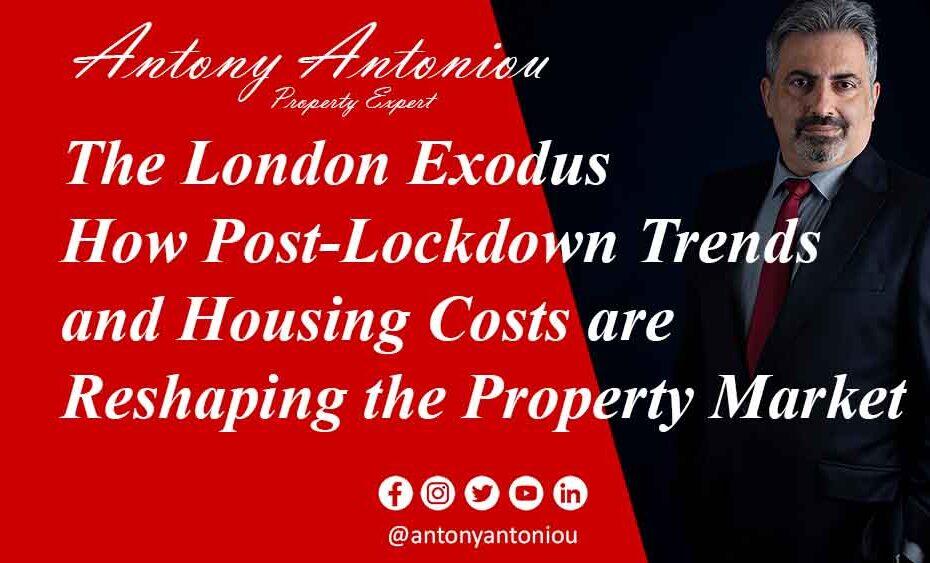The London Exodus – How Post-Lockdown Trends and Housing Costs are Reshaping the Property Market
In recent times, a noticeable shift has been occurring in London, one that is sending ripples through the property market. The apparent exodus from the bustling metropolis is exerting a notable impact on house prices, raising questions about the causes and implications of this phenomenon. Is this movement a consequence of the post-lockdown landscape, or is it a reflection of the ongoing struggles with housing affordability? Let’s delve into the factors that are reshaping the property market and explore the stories behind the numbers.
**Post-Lockdown Shifts and Housing Trends**
As we emerge from the global pandemic, the way we live and work has undergone a significant transformation. This has inevitably influenced housing preferences and choices. London, once a magnet for young professionals and families seeking opportunities, is now seeing a trend of residents seeking greener pastures beyond the city limits.
Part of this trend can be attributed to the aftermath of the lockdown. The experience of remote work has prompted many to reassess their priorities, seeking homes that offer more space, better quality of life, and affordability. Additionally, the desire to avoid crowded urban spaces and the need for larger living environments have driven people to explore options outside of London.
**The Affordability Quandary**
A crucial component contributing to the London exodus is the escalating cost of housing. The average home in the UK costs around eight to nine times the average annual income, a stark contrast from the four to five times it was back in the mid-90s. London, however, takes this disparity to a new extreme, where the multiple is as high as 12 to 15 times. This steep divide is especially felt by first-time buyers, with over half of them relying on familial assistance, popularly dubbed the “Bank of Mum and Dad.”
The unfairness of this situation becomes apparent when considering the families working just as diligently but unable to afford their property. Instead, they find themselves paying rent that indirectly contributes to someone else’s mortgage. This housing disparity not only highlights a financial imbalance but also underscores the impact on social and economic mobility.
**Rising Interest Rates and Migration Patterns**
Adding to the complexity is the effect of rising interest rates on housing affordability. Since 2021, the average two-year fixed-rate mortgage has surged from 2.52% to a staggering 6.85%. London, in particular, has felt the brunt of this increase, with a substantial 30% of first-time buyers leaving the capital due to unmanageable costs. This is a significant jump from the mere 12% seen in 2013, indicating a clear shift in migration patterns.
**Beyond London: The Ripple Effect**
As London residents seek more accessible housing markets, they inevitably influence property prices in neighbouring cities and towns. For instance, places like Bristol are experiencing an influx of London money, causing local residents, who have deep-rooted connections to these areas, to be squeezed out due to skyrocketing prices. This creates a domino effect where urban migration drives up costs in other regions, perpetuating an affordability crisis.
**The Future Landscape**
The current trend of residents leaving London, especially for those unable to upgrade within the city, raises questions about the sustainability of such a shift. This outflow, combined with the rising cost of living, could ultimately transform London into a city accessible only to the privileged elite, while the hands-on workforce required for essential services remains pushed out by these financial challenges.
Furthermore, the increase in crime rates, often accompanying rises in living costs, adds another layer to the complex narrative. A growing number of individuals, even those in professional roles, are questioning the value of city living and contemplating a move away from London.
**Conclusion**
The exodus from London and its cascading effects on housing markets and society at large underscore the intricate interplay of factors that define where and how we live. The ongoing struggles with housing affordability, exacerbated by rising interest rates and post-lockdown realisations, are shaping the future of urban landscapes. As the London exodus continues, it prompts us to reflect on the need for more equitable housing policies and the preservation of the diverse socioeconomic fabric that makes our cities vibrant and inclusive.

